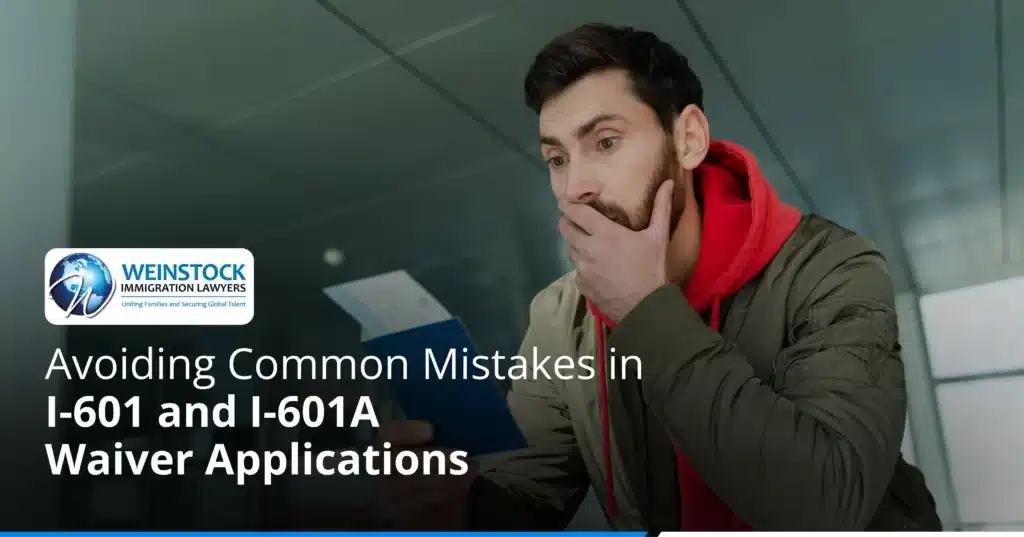In U.S. immigration, the I-601 and I-601A waivers of inadmissibility are essential because they enable people who would not otherwise be able to enter or stay in the country to apply for legal status. These applications, however, are intricate and need careful planning. This guide serves as a comprehensive resource to help you navigate the intricacies of these waivers, avoid common pitfalls, and improve your chances of success.
What is the I-601A Waiver?
The I-601A waiver, also known as the Provisional Unlawful Presence Waiver, allows certain individuals who are inadmissible due to unlawful presence to seek a waiver before leaving the U.S. for consular processing. This waiver is particularly beneficial for immediate relatives of U.S. citizens, as it minimizes the time spent abroad during the green card process.
Key Benefits of the I-601A Waiver
Here are some Benefits of the I-601A Waiver:
- Reduces family separation during consular processing.
- Provides an opportunity to address inadmissibility issues proactively.
- It is tailored for immediate relatives, promoting family unity.
I-601A Waiver Application Process
The application process for an I-601A waiver involves several critical steps:
- Eligibility Assessment
Verify that you meet the eligibility criteria for the waiver, including having a qualifying relative (U.S. citizen or lawful permanent resident spouse or parent) who would experience extreme hardship if you were denied.
- Form Preparation and Submission
Complete Form I-601A, ensuring all required evidence is included. This includes documentation of your qualifying relationship, proof of extreme hardship, and any supporting materials.
- Biometrics Appointment
Attend the scheduled biometrics appointment for fingerprinting and background checks.
- USCIS Decision
USCIS will review your application and make a determination based on the evidence provided.
I-601A Waiver Processing Times
Processing times for I-601A waivers can vary depending on USCIS workload and individual case complexities. Average processing times range from 12 to 18 months. Delays can occur if additional documentation is requested or if the application is incomplete.
Tips to Expedite Processing
Here are some tips for Expedite processing:
- Submit a thoroughly prepared application with all required evidence.
- Respond promptly to any Requests for Evidence (RFEs) issued by USCIS.
- Monitor your case status regularly through the USCIS online portal.
Who Qualifies for a Waiver of Inadmissibility?
A clear understanding of the eligibility criteria is essential for submitting a successful waiver application, as individuals may qualify if they meet specific requirements, such as:
- Are subject to inadmissibility due to unlawful presence in the U.S. for more than 180 days.
- Have a qualifying relative (U.S. citizen or lawful permanent resident spouse or parent) who would face extreme hardship without their presence.
- Are otherwise eligible for an immigrant visa.
It is important to note that not all grounds of inadmissibility can be waived with an I-601A waiver. For example, inadmissibility due to criminal convictions or fraud may require a separate I-601 waiver.
What Next After I-601A Waiver Approval?
Once your I-601A waiver is approved, you will proceed with consular processing for your immigrant visa:
- Scheduling a Consular Interview
Contact the National Visa Center (NVC) to schedule your interview at the designated U.S. embassy or consulate.
- Prepare for the Interview
Bring all required documentation, including the I-601A waiver approval notice, financial evidence, and medical examination results.
- Attend the Consular Interview
The consular officer will review your case and make a final determination on your visa application.
- Reuniting in the U.S.
If approved, you can return to the U.S. with your immigrant visa and continue your pathway to lawful permanent residence.
Common Mistakes to Avoid in I-601 and I-601A Waiver Applications
Mistakes in waiver applications can result in delays or denials. Avoid these common mistakes:
1. Insufficient Documentation of Extreme Hardship
Failing to provide compelling evidence of extreme hardship to a qualifying relative is one of the most common reasons for denial. Ensure that you include:
- Medical records, financial statements, and affidavits.
- Evidence of country conditions that exacerbate hardship.
2. Errors in Form Preparation
Even small errors, such as incorrect names or missing information, can lead to delays. Double-check your application for accuracy and completeness.
3. Ignoring Legal Counsel
Navigating immigration laws can be challenging. Consulting an experienced immigration attorney can help you avoid errors and strengthen your case.
4. Failing to Respond to RFEs
If USCIS requests additional evidence, respond promptly and thoroughly. Ignoring an RFE can result in denial.
Recent Trends in I-601A Waiver Applications
The I-601A waiver program has evolved since its introduction, with several recent trends impacting applicants:
- Increased Scrutiny on Hardship Claims
USCIS has heightened its review of hardship claims, making it essential to provide robust and well-documented evidence.
- Longer Processing Times
Recent surges in applications and USCIS staffing issues have led to extended processing times. Planning ahead is crucial.
- Policy Updates
Stay informed about changes to USCIS policies and guidelines, which can directly affect eligibility and processing.
Planning beforehand and paying close attention to details are necessary when applying for an I-601 or I-601A waiver of inadmissibility. Understanding the prerequisites, the application procedure, and any potential obstacles can help you avoid frequent blunders and improve your chances of success. Gaining legal status in the US can be simplified and your chances of success increased by speaking with knowledgeable immigration specialists.
Weinstock Immigration Lawyers can assist you with your I-601A waiver application. Our experience with complicated waiver scenarios will ensure that your application receives the attention it deserves.

